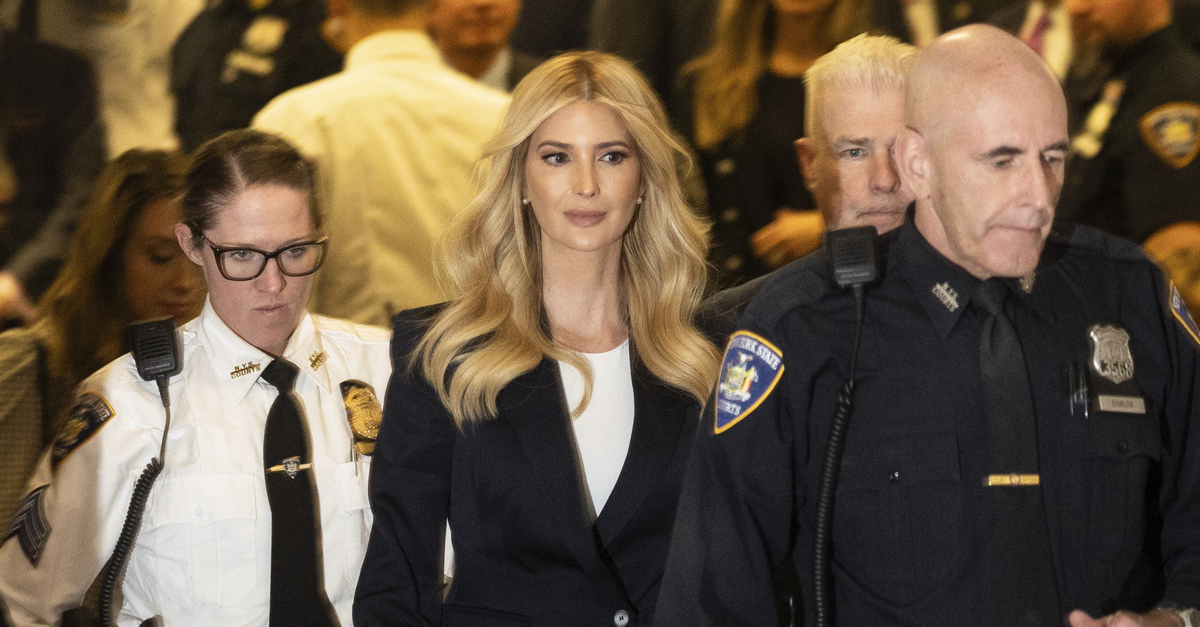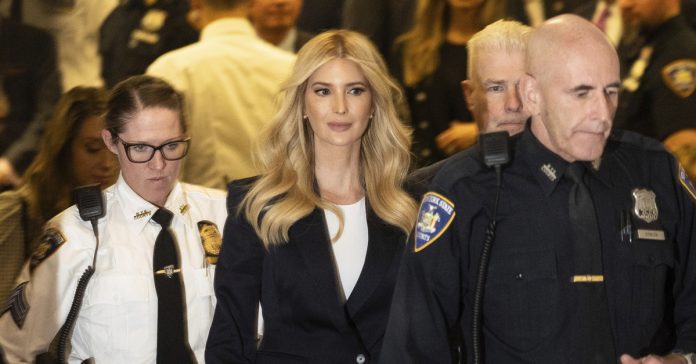
Ivanka Trump exits the courtroom during a civil fraud trial against former President Donald Trump at New York Supreme Court, Wednesday, Nov. 8, 2023, in New York. (AP Photo/Yuki Iwamura)
Ivanka Trump took the stand on Wednesday morning to provide compelled testimony in her father’s ongoing civil fraud trial.
After multiple failed appeals, filings, and motions to elude the confines of the New York State Supreme Court in lower Manhattan, the former president’s widely-presumed-to-be favorite child was jokingly welcomed to the witness stand by the judge overseeing the case.
“The People call Ivanka Trump,” New York Attorney General counsel Louis Solmon announced before she entered the courtroom.
Justice Arthur Engoron asked: “Who’s she?”
Ivanka Trump was initially listed as a named defendant in the $250 million lawsuit targeting her family’s namesake business empire. She was dismissed from the litigation in June. Her father and her brothers, Donald Trump, Jr., and Eric Trump, remain named defendants.
The litigation was brought against the former Republican president, his children, and the Trump Organization in September 2022 by New York Attorney General Letitia James, a Democrat, and aims to essentially kick numerous Trump-related entities out of the Empire State. Key findings in the case came by way of a late September ruling on the state’s motion for summary judgment in which Engoron determined numerous instances of fraud had, in fact, occurred on various financial documents filed by the company’s trustees – including the 45th president himself.
Ivanka Trump had served for years as executive vice president of the Trump Organization, a title also given to her brothers. Each of the Trump children at the helm of the business, however, had different portfolios during their tenure with the real estate behemoth.
Early on, Ivanka Trump was asked questions about her own specific role in the company. She explained that her efforts were largely focused on the redevelopment of the Old Post Office building in Washington, D.C., and the Trump Doral golf course in Miami.
“I spent an enormous amount of time shepherding those two properties through development,” the witness said, according to a courtroom report by The Messenger’s Adam Klasfeld.
Like her brothers who have testified, Ivanka Trump was asked about her knowledge of Generally Accepted Accounting Principles, a system often referred to by its acronym, GAAP. She replied that she recalled being asked about GAAP during her deposition and said her answer remained the same: her understanding was general – an answer in line with what her two siblings have testified to as well.
Questioning quickly turned to the heart of the matter in the financial documents case: alleged misrepresentations made on paper about money and wealth. The attorney general’s office has proven that several financial statements contained misrepresentations. This was done, the state argues, to secure better-than-average interest rates.
Multiple efforts to secure the necessary financing withered on the vine, the witness testified. The defense repeatedly objected to the state showing such discussions of deals in progress, claiming they were not relevant because the discussions never moved to stages where formal documents were involved.
Kise is objecting to these questions on relevant grounds. The implication, of course, of reviewing these kinds of emails with other prospective lenders is that the Trumps could not obtain a loan for Doral on standard terms for a commercial real estate project.
— Lisa Rubin (@lawofruby) November 8, 2023
After going back and forth over the various potential financing deals for Doral that were ultimately abandoned, Solomon provided Ivanka Trump with a series of 2011 documents related to negotiations with then-Deutsche Bank employees Rosemary Vrablic and Dominic Scalzi.
“My father and I are very much looking forward to meeting with you tomorrow to discuss Doral,” Ivanka Trump wrote in one email to Vrablic. “I have attached our investment memo as well as some basic information on our golf and hotel portfolios.”
During the Doral-Deutsche Bank financing discussion, Solomon described loan terms as much more favorable than normal and then highlighted two things the bank asked for in return, according to a courtroom report by MSNBC legal analyst Lisa Rubin.
The bank sought a full and complete guaranty from Donald Trump that he would personally cover the principal and interest that accrued on the loan, along with the operating expenses. In service of that, the bank’s second request was a requirement that Trump himself have a net worth of at least $3 billion – not including the so-called “brand value” of the Trump real estate group.
Those asks posed a problem, but Ivanka Trump allegedly shared details of the pending deal with others.
The state pulled up a December 2011 email from Ivanka Trump in reference to the Doral financing offer from Deutsche Bank.
This email was allegedly sent by the witness to then-Trump Organization CFO Allen Weisselberg and other company executives.
In the email, Ivanka Trump wrote: “It doesn’t get better than this. lets discuss asap.”
The email addressed to Weisselberg was quickly contested by the defense. Trump lawyer Alina Habba objected that it was not actually sent. The state disputed and said it was sent. After some back-and-forth, Engoron allowed questioning on the document to go forward.
In another email, Trump Organization lawyer Jason Greenblatt wrote that Donald Trump might scoff at personally guaranteeing the loan and said the minimum net worth requirement could be an issue, according to a courtroom report by Daily Beast’s Jose Pagliery.
“I will review, but not immediately that this is a FULL principal and interest and operating expense personal DJT guaranty,” the lawyer wrote. “Is DJT willing to do that? Also, the net worth covenant and djt indebtedness limitations would seem to me to be a problem?”
“That we have known from day one,” Ivanka Trump replied. “We wanted to get a great rate and the only way to get proceeds/term and principle where we want them is to guarantee the deal.”
According to the attorney general’s office, Trump’s net worth was substantially lower than $3 billion in 2011.
Despite whatever the potential problem on the company’s end was, Donald Trump told Deutsche Bank his net worth was greater than $4 billion, the state noted.
Ivanka Trump testified that she was in no way, shape, or form involved in the crafting of her father’s financial statements and said she did not know he claimed such a high net worth at the time.
In a marked up term sheet provided by the Trump Organization to Deutsche Bank, the company lowered the net worth requirement to $2 billion.
In the end, the bank and the Trump Organization agreed on the terms of the financing deal, Ivanka Trump testified.
The loan was signed by her father.
As the morning session drew to a close, questioning turned to Ivanka Trump’s shepherding of the Old Post Office renovation project. That project necessarily involved the General Services Administration, because the building is owned by the U.S. government.
The state put forth a December 2011 email from the GSA saying the agency found “multiple GAAP departures” in Donald Trump’s annual statements of financial condition. Those statements are the crux of the case against the company — the same documents Engoron has already ruled were fraudulent. The upshot of that document, to hear the attorney general’s counsel say it, was that Ivanka Trump, who received the email, was aware of those alleged departures.
The witness did not recall those specific phrases or terms, she said, but acknowledged that she knew the GSA had “questions” and that the Trump Organization would work to supply some “answers.”
The court went on recess right after the state sought to introduce an email between the witness and her husband, Jared Kushner, in which the two discussed financing sources for the Post Office deal.
Defense counsel objected on spousal privilege grounds and Engoron said that lunch was a good time to mull the issue over. Upon returning from the lunch break, Engoron announced that the email between Jared Kushner and Ivanka Trump is admissible because the messages were sent through work accounts.
Have a tip we should know? [email protected]

